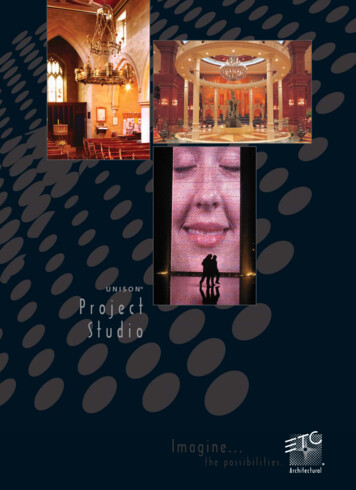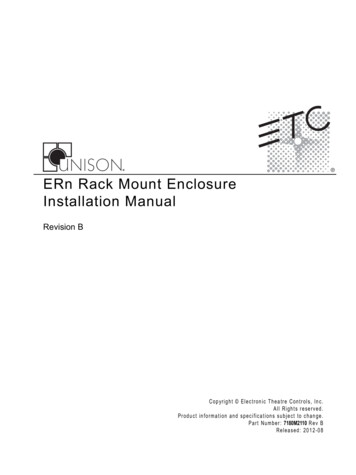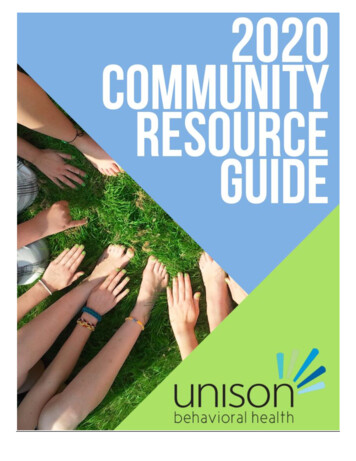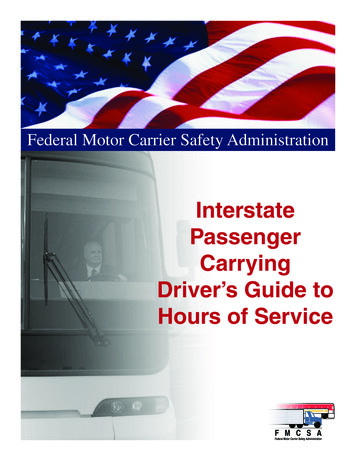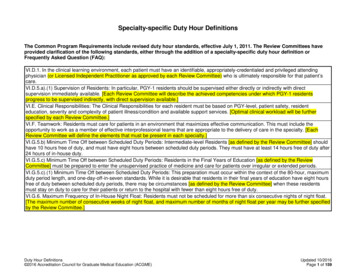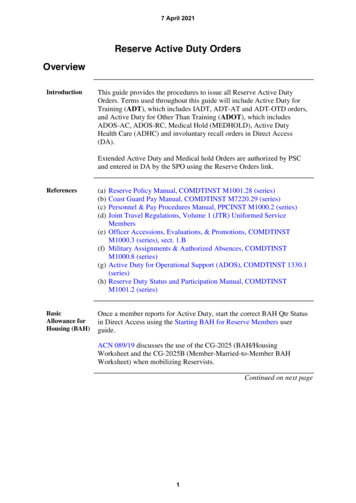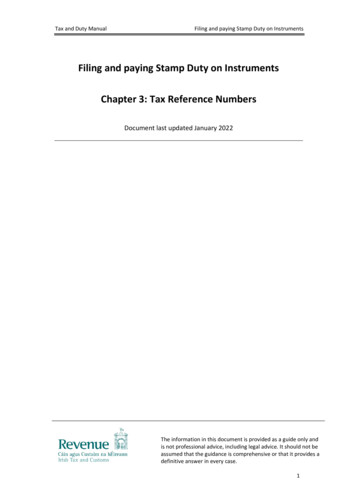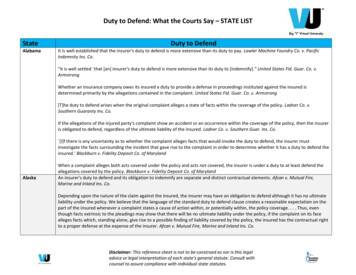
Transcription
UNISON duty of care handbookFor members working in health and social care
‘‘At a time of change, patients and service usersdepend more than ever on the integrity of careprofessionals. This handbook is a valuable guideto health and care professionals’ responsibilitiesand rights, and to sources of help when it may behard to know the right thing to do and even harderto do it.‘‘Harry Cayton, chief executive, Council for Healthcare Regulatory Excellence‘‘Safeguarding the public and delivering highquality patient care are essential. Key to this iscreating a culture where nurses and midwivesare able to appropriately raise concerns,particularly in a time of significant structural changeacross health care organisations. This handbookis a useful supplement to the Code and otherNMC standards and guidance which specify theresponsibilities of nurses and midwives in raisingand escalating concerns.‘‘Professor Dickon Weir-Hughes, chief executive and registrar,Nursing and Midwifery Council‘‘The Health Professions Council (HPC) is committedto protecting the public and ensuring that professionalsare meeting UK standards for their training, professionalskills, behaviour and health. Unison’s Duty of CareHandbook provides a useful accompaniment to theHPC’s guidance and standards, and assists in maintaininggood practice across the health and social care setting.‘‘Marc Seale, chief executive and registrar, Health Professions Council
ForewordBy Dave PrentisThe Duty of care handbook is intended toassist all those seeking guidance on how bestto question and challenge unsafe practice inhealth and social care settings. Its broad scopemeans that it is applicable to all occupations across the public,private and voluntary sectors, making it relevant for all thosewho have concerns and wish to find an effective and responsibleway of voicing them.In recent years, there have been high-profile cases whichdemonstrate how pressures on staff and services can lead tofailures in the duty of care – including the report into the tragicdeath of baby Peter as well as the Francis Report whichrevealed failings in care standards at Mid Staffordshire NHSFoundation Trust.Both of these events have changed the landscape of how we lookat the duty of care. They have reminded us of the vital importanceof raising concerns and acting on them before it is too late, and ofdeveloping a workplace culture which enables staff to have theconfidence they need to speak out.There is clear evidence, including recent research conducted byAston University, which shows that high levels of staff engagement,where staff are encouraged to contribute to decisions thataffect them in the workplace, have a positive impact on financialmanagement, health and well-being, quality of service andpatient satisfaction.This handbook aims to empower UNISON members workingin health and social care to have a positive influence and be theguardians of safe, effective and high-quality services.Dave PrentisUNISON duty of care handbook3
Contents1 Introduction . 52 The duty of care . 63 Your duty of care . 73.1 Registered professionals . 83.2 Members of professional bodies or associations . 103.3 Managers . 113.4 Students and trainees . 113.5 Trade union representatives. 114 When your employer’s instructions conflict with your duty of care . 135 Statutory rights and duties . 145.1 The public interest – ‘whistleblowing’. 145.2 Equality legislation . 145.3 Health and safety legislation . 155.4 Working Time Regulations . 155.5 Regulation of health and social care providers . 165.6 Scrutiny bodies . 165.7 The NHS constitution (England only) . 166 Health and well being at work . 177 Using workplace protocols to support the duty of care .187.1 Best practice guidelines . 187.2 Quality standards . 187.3 Training and supervision . 187.4 Workload management . 197.5 Customer complaints . 19. 197.6 Risk registers7.7 Escalation plans . 207.8 Measuring unmet need. 207.9 Positive risk taking and structured judgement. 208 Maintaining and supporting the duty of care . 229 Challenging unsafe practices – the steps to take . 2410 The duty of care as an organising tool . 26A Case studies – workload and staffing . 27B Case studies – health and safety . 33C Case studies – skills and training . 354UNISON duty of care handbook
1IntroductionHealth and social care staff across the UK are being confronted withchanges to services, vacancy freezes, increasing workloads andreductions in staffing and budgets. Occupational boundaries and theway services are being delivered are also changing. With all thesepressures on health and social care services there has never beena more important time to ensure that the services you provide areeffective and safe.As a health or social care worker you owe a duty of care to yourpatients/service users, your colleagues, your employer, yourself andthe public interest.When there is pressure on staff or services it can impact on yourduty of care. For example, if there are excessive workloads,changes to services, inappropriate delegation of tasks or poorhealth and safety practice.This handbook is intended to assist good practice and improve servicesby giving guidance on how to tackle concerns about unsafe practiceeffectively and positively, and in partnership with employers. It will alsohelp you to influence plans to change services or staff roles and enableUNISON members to be guardians of safe, effective services.UNISON duty of care handbook5
2The duty of care‘Duty of care’ is a phrase used todescribe the obligations implicit in yourrole as a health or social care worker.As a health or social care worker youowe a duty of care to your patients/service users, your colleagues, youremployer, yourself and the public interest.Everyone has a duty of care – it is notsomething that you can opt out of.The duty of care applies to all staff ofall occupations and levels. It appliesto those working part time or full time,those in agency or temporary rolesas well as students and volunteers.You have a duty of care, whether youare a registered professional or nonregistered. It applies to everyone,from nurses to porters, cleaners toreceptionists, paramedics to therapistsand technicians to social workers.The duty of care to a patient or serviceuser exists from the moment theyare accepted for treatment or a taskis accepted and they begin to receiveservices. This may be, for example,on admission to a ward, acceptanceonto a caseload or once registeredat an accident and emergencydepartment. You have a duty of careto all patients or service users evenif you are not directly responsible fortheir care.6UNISON duty of care handbookAll health and social care organisations,whether they are public, private orvoluntary organisations, also have a dutyof care. Their duty of care is to providea comprehensive service to citizens andto demonstrate that, within the availableresources, the appropriate prioritiesare chosen. They must also ensure thatthose people who are providing careare able to do so safely.Just because an employee or employercannot do everything that they believeneeds to be done, does not meanthey have breached their duty of care.There are not limitless resourcesavailable, therefore the obligation ofan employee and employer is to ensurethat what is actually done is donesafely and in an appropriate and timelymanner. They should also make it clearwhat cannot be done.
3Your duty of careYour duty of care means that you mustaim to provide high quality care to thebest of your ability and say if there areany reasons why you may be unable todo so.You must adhere to a standard ofreasonable care and you are expected to:n keep your knowledge and skills upto daten provide a service of no less a qualitythan that to be expected based onthe skills, responsibilities, and rangeof activities within your particular tradeor professionn be in a position to know what mustbe done to ensure that the serviceis provided safelyn keep accurate and contemporaneousrecords of your workn not delegate work, or acceptdelegated work, unless it is clearthat the person to whom the workis delegated is competent to carryout the work concerned in a safeand appropriately skilled mannern protect confidential information exceptwhere the wider duty of care or thepublic interest might justify disclosureIn addition to these expectations,all employees have obligations andrights arising from their contract ofemployment. These may be foundin various documents. For example:n the statement of terms andconditions of employment whichmust include details of the salarypaid, holiday entitlement, and so onn other documents which are drawnto the attention of the employee –such as disciplinary procedures,job descriptions, clinical protocols andstandards, work rules (on everythingfrom parking to health and safety)n statutory terms which are assumedto apply to all contracts (eg healthandsafety legislation, anti-discriminationlegislation, unfair dismissal andredundancy rights, the right to‘blow the whistle’)All contracts of employment also include‘implied duties’. These exist whether ornot they are actually written down as partof the contract.They include an obligation for theemployee to work in accordance withlawful orders, co-operate with theiremployer, serve the employer faithfullyand honestly and exercise skill andcare in the performance of their work.In return, the employer is obliged to payagreed wages for duties performed orwhich the employee is ready to perform,provide a safe working environment,act in good faith and behave reasonablytowards the employee.It is the responsibility of employers toprovide all staff with clear rolesand responsibilities, along with theappropriate training.As a practitioner you should not be askedto perform any task which is beyond yourlevel of competence. If you are beingasked to take on tasks which you are notproperly equipped or trained to do thenyou should decline to do the task andexplain why. If you are under pressureand worried about what will happen if youdecline to do a task then you should seekadvice from your local trade union rep.The duties and principles outlined aboverelate to all staff. However, there arecertain groups of staff such as registeredprofessionals, members of professionalassociations, managers, students andtrade union representatives who havesome unique or additional rights andresponsibilities in terms of their duty ofcare. These are summarised overleaf.UNISON duty of care handbook7
33.1 Registered professionalsCertain health and social careprofessionals must be registered inorder to practice their professionand use a professional title such as‘occupational therapist’ or ‘paramedic’,for example. These individuals mustregister with a regulator who is set upto protect the public (see full list below).Each regulator keeps a register ofindividuals who are expected to meetand maintain certain standards ofcompetence and conduct. They canalso remove individuals from the registerif they do not meet these standards.If you are a registered professional,in addition to your duty of care as ahealth or social care worker, you mustalso keep to the various standards ofperformance, conduct, competencyand ethics which are outlined by yourprofessional registration body. In generalterms, these standards are referredto as a Code of Professional Conduct.Every registrant must read thesestandards, and agree to keep to them,even if they are not practising.circumstances, the practitioner’sobligations to their Code take precedenceover their obligation to obey a conflictinginstruction. Therefore practitioners canuse their Code of Professional Conductas a positive tool enabling them toadvocate the interests of their patientsor service users.The regulators of health and social careprofessions in the UK include:HealthNursing and Midwifery Council (UK):nmc-uk.orgUseful documents include:n The code: standards of conduct,performance and ethics for nursesand midwivesn The code in practicen Raising and escalating concerns:guidance for nurses and midwivesAdditional UNISON guidance whichmay be helpful includes:n Speaking up, speaking out –guidance from UNISON nursingand midwifery sectorA breach of these standards by anindividual carries the risk of suspensionor removal from the professional register.Removal from the register makes itunlawful for you to practise in yourregistered profession, and unlawful forany employer to employ you in that role.General Pharmaceutical Council(England, Scotland and Wales):pharmacyregulation.orgIt is reasonable to assume that anyCode of Professional Conduct issuedby a statutory regulatory body is implicitwithin the contract of employment inthe same way that the duty of care is.Therefore any instruction by an employerwhich requires a registered professionalto breach their Code of ProfessionalConduct should be regarded as anunreasonable one and should bequestioned and challenged. In suchPharmaceutical Society of NorthernIreland (Northern Ireland): psni.org.uk8UNISON duty of care handbookUseful documents include:n Standards of conduct, ethics andperformanceUseful documents include:n Code of ethicsOther health regulators include:General Chiropractic Council, GeneralDental Council, General Medical Council,General Optical Council and GeneralOsteopathic Council.
3Health and social careHealth Professions Council (UK):hpc-uk.orgCurrently the HPC regulates fifteenprofessions including: arts therapists,biomedical scientists, chiropodists/podiatrists, clinical scientists, dietitians,hearing aid dispensers, occupationaltherapists, operating departmentpractitioners, orthoptists, paramedics,physiotherapists, practitionerpsychologists, prosthetists/orthotists,radiographers, and speech andlanguage therapists.From 2012, the HPC will be knownas the Health and Care ProfessionsCouncil and is expected to regulatesocial workers in England.Useful documents include:n Standards of conduct, performanceand ethicsn Standards of education and trainingn Your guide to our standards forcontinuing professional developmentn Raising and escalating concerns inthe workplaceSocial careGeneral Social Care Council (England):gscc.org.uk (functions due to transfer tothe Health and Care Professions Councilfrom 2012.)Scottish Social Services Council:sssc.uk.comCare Council for Wales:ccwales.org.ukNorthern Ireland Social Care Council:niscc.infoUseful documents include:n Codes of practice for social careworkers and employers of socialcare workersNote: The codes of practice for socialcare workers and employers of socialcare workers apply across all fourUK social care regulators. However,the functions of the General SocialCare Council are due to be transferredto Health Professions Council from2012, which will see the introductionof a new code and standards forsocial care registrants in England.Additional UNISON guidance draftedby the Social Work Issues Group (SWIG),a subgroup of the UNISON ScotlandLocal Government Committee is availablefrom unison-scotland.org.uk/socialwork.This includes:n Helping people change their lives:a social work manifesto for UNISONand BASW members in Scotlandn Keeping safe in the workplace:a guide for social work practitionersn Supervision and workloadmanagement for social work:a negotiating resourceCouncil for Healthcare RegulatoryExcellence (CHRE)The Council for Healthcare RegulatoryExcellence (soon to be known asthe Professional Standards Authorityfor Health and Social Care) is anindependent body which oversees thehealth professional regulators in theUK and in doing so promotes the health,safety and well-being of patients andthe public. It has powers to carry outregular performance reviews of eachregulator and provides policy advice to theSecretary of State and health ministersin Scotland, Wales and Northern Irelandon the regulation of health professionals.For more information go to: chre.org.uk.Regulation of health and socialcare support staffOver the last few years there hasbeen an increasing push to regulatehealth and social care support staffUNISON duty of care handbook9
3and assistant practitioners that workalongside registered professionals.For example, health care assistants,occupational therapy and other alliedhealth professional support workers,healthcare scientists, pathologyassistants and social care supportstaff. Many of these unregulated supportstaff have seen significant changes totheir role over time and many are nowundertaking work which was previouslydone by registered professionals.New mechanisms are being put in placewhich will regulate these staff. Forexample in Scotland, an employer-ledmodel of regulation for health careassistants has been implemented:(see healthworkerstandards.scot.nhs.ukfor the code of conduct for healthcaresupport workers in Scotland) andthe Scottish Social Services Councilis implementing regulation of socialservices support staff.The full scope of such changes is notyet clear. UNISON will continue tocampaign to ensure that any newregulatory procedures that are put inplace are robust and provide staff withthe training and support to maintainhigh standards of care. For those supportstaff who find themselves subject toregulation, the standards and codesof practice they are expected to meetas a regulated practitioner will be animportant benchmark for assessingany threats to the duty of care.3.2 Members of professional bodiesor associationsUNISON has relationships with severalbodies which advocate and promotecertain health and social care professions.For example, the British Associationof Occupational Therapists (BAOT),British Association of Prosthetists and10UNISON duty of care handbookOrthotists (BAPO), Association ofPharmacy Technicians (APTUK) andCollege of Operating DepartmentPractitioners (CODP).These bodies provide professional adviceto their members, in addition to the tradeunion advice and support that UNISONoffers. They set out the recommendedstandards of ethics, conduct and practicefor the members of their profession.In many cases, these recommendedstandards will also apply to non-registeredstaff such as support workers andassistants working in the profession.Although they are not legally enforceablelike the Code of Professional Conductset by registration bodies, any breachof the standards outlined by yourprofessional body is a threat to the dutyof care. Therefore these standards are auseful means to highlight and raise anyconcerns you have around your ability topractise safely and effectively.British Association of OccupationalTherapists (BAOT): baot.org.ukUseful documents include:n Code of ethics and professionalconduct for occupational therapistsn Professional standards foroccupational therapy practiceBritish Association of Prosthetistsand Orthotists (BAPO): bapo.orgUseful documents include:n The ethical code and professionalconduct for prosthetists and orthotistsAssociation of Pharmacy Technicians(APTUK): aptuk.orgUseful documents include:n General Pharmaceutical Councilstandards of conduct, ethics andperformance
3College of Operating DepartmentPractitioners (CODP): codp.org.ukUseful documents include:n The scope of practice for registeredoperating department practitioners3.3 ManagersManagers have the same duties asall employees; to follow lawful andreasonable instructions and have a dutyof care towards those they manage,to patients/service users and the public.Faced with potential or actual problems,a manager is expected to enable staffto voice their concerns and identify whystaff (or others) may believe a situationis potentially unsafe.They must consider the priorities andprotocols set by the employer andthe resources and equipment that areavailable and determine what can bedone safely. This may involve consideringwhether things could be done differently,but could also involve deciding certaintasks or roles will not be done until theycan be done safely.3.4 Students and traineesStudents and trainees also have a dutyof care; however the standard is differentto that of a qualified practitioner. Traineesand students cannot be professionallyaccountable in the same way that fullytrained practitioners are. They are notexpected to reach the standards ofa fully qualified practitioner and shouldnever be asked to work except whenthey have been adequately preparedand are supervised by an appropriatelyqualified member of staff.Should a student or trainee be askedto undertake tasks which they believethey are not qualified to do, then theymust make that clear, initially to theirsupervisor, and if necessary to their tutoror a more senior manager. Inappropriatedelegation (whether by act or omission)is a very serious matter. The supervisor(and training establishment) has a dutyto ensure the student or trainee does notundertake tasks or responsibilities theyare not qualified to.3.5 Trade union representativesIf the manager is not qualified in theoccupation in question, they should takeadvice from an appropriately trainedperson who is. And they should ensurethat whatever steps are taken do notcompromise the professional judgementof their staff or themselves.Trade union representatives have anumber of legal rights and policiesto draw on in insisting they be properlyconsulted on the issues relating toduty of care. They are also able workin partnership with the employer toresolve issues of concern.And remember, if the manager is amember of a professional register, theymust adhere to their Code of ProfessionalConduct, even if they are not practising.These rights include the right to accessinformation for collective bargainingpurposes, to be consulted, in goodtime, on any potential redundancies ortransfers of staff or services, and accessto paid time off, training and facilitiesfor their trade union duties.If a potentially unsafe situation existsthen they must inform their own managerin writing, explain why, and seek advice.They will then need to ensure that theissues they have raised receive an earlyand appropriate response, which shouldbe confirmed in writing.There is also a right for trade unionmembers to elect health and safetyrepresentatives to inspect and beconsulted on health and safety mattersUNISON duty of care handbook11
3and to elect learning representativesto influence training and learning in theworkplace. No representatives shouldbe victimised or treated less favourablybecause of their trade union role.Also, trade union members have a rightto reasonable time off (without pay unlessagreed with management) to attend tradeunion meetings.These are the basic rights available – youshould check your local or country-widerecognition and facilities agreements tosee what other rights may apply or couldbe agreed in the future.Remember, if a trade union representativeis also on a professional register thenthey must adhere to their Code ofProfessional Conduct whilst undertakingtheir trade union duties, for example,by maintaining patient/service userconfidentiality or by acting on ‘off therecord’ information in order to preventharm to others.12UNISON duty of care handbook
4When your employer’s instructions conflictwith your duty of careThere may be times when the duty ofcare may require an individual or groupof staff to question or challenge theiremployer’s instructions. For example,when there is a conflict between whattheir employer expects them to do andwhat they believe is in the best interestsof patients/service users, the health ofcolleagues or themselves, or the widerpublic interest.Your obligation to work in accordancewith the lawful contractual instructionsof your employer may be challengedin certain circumstances.For instance:n where an instruction is unlawful – forexample requiring individuals to drivevehicles or operate machinery theyare not qualified to drive or operaten where an instruction is clearlyunsafe – either in breach of astatutory requirement or a serioushealth and safety riskn where an instruction conflicts withstatutory rights and obligations –for example insisting staff breachanti discrimination legislation orthe Working Time Regulationsn where an instruction is outside theemployer’s contractual authority –for example imposing obviously andintolerably unfair requirements onemployeesn where there is insufficiently directinstruction – for example wherethere are conflicting instructionsfrom different managersn where an instruction conflicts withimplied contractual duties – especiallythe individual’s duty of care ortheir Code of Professional ConductBefore any changes are made to workingarrangements, services or resources,employers and employees must ensurethat all the duty of care requirementscan be met. If you become worried thata situation could lead to your duty ofcare being compromised then you shouldraise these concerns to ensure yourduty of care and the public interestis safeguarded.Some examples of situations wherethe expectations of your employermay conflict with your duty of caremight include:n being expected to undertakean excessive or unsafe workload,for example being expected totake on too many cases or copewith inadequate ratios of staffn being asked to implementquestionable delegation of tasksor roles, for example being askedto take on tasks you are not trainedfor or to delegate tasks to someoneelse who is not properly trainedn being told to follow potentiallyunsafe instructions, for example,being asked to undertake a taskwith inadequate or faulty equipmentn being expected to work in anenvironment which is unsafe forstaff or patients/service users,for example poor hygiene leadingto hospital acquired infectionsn being harassed at work by otherstaff, managers or membersof the public or suffering frombullying or stressn working in a workplace where aclimate of fear prevents properconcerns about patient/service usercare or staff safety being raisedn being asked to collude ininappropriate allocation or reductionof resources not in the best interestsof patients/service usersThere are a series of case studies at theback of this handbook which show howdifferent individuals or groups of staffmay find themselves in a situation wheretheir duty of care is compromised.These case studies aim to help you tounderstand how workplace problemscan affect your duty of care and howbest to raise concerns and find solutions.UNISON duty of care handbook13
5Statutory rights and dutiesAlongside your contracted terms andconditions of employment there are anumber of statutory rights and dutiesthat may help you if you are concernedthat your duty of care conflicts withmanagement instructions. These rightsand duties are specified in legislation.Some important examples areincluded below:5.1 The public interest –‘whistleblowing’Under the Public Interest Disclosure Act1998 workers have a right to ‘blow thewhistle’ if management instructions areconflicting with their duty to act in thepublic interest. Examples might includewhere an individual believes clinicalpractices or equipment are dangerouslyunsafe, or where serious misuse of fundsor resources (e.g. fraud or waste) isdiscovered. Every employer should havea whistleblowing procedure in place tofacilitate the disclosure of this kind ofsensitive information.Whistleblowing is a serious issue.Therefore it is essential that any memberwho is considering whistleblowing seeksadvice from UNISON first. The provisionsin the Public Interest Disclosure Actare complicated, so it is absolutely vitalto always seek advice from the union(and involve the local branch and regionaloffice) before making any disclosure,to make sure that the memberis protected from any action by theemployer afterwards.Someone making such a disclosure mustdo so in good faith (even if later it turnsout to be untrue) and must believe that
This handbook is intended to assist good practice and improve services by giving guidance on how to tackle concerns about unsafe practice effectively and positively, and in partnership with employers. It will also help you to influence plans to change services or staff roles and enable UNISON members to be guardians of safe, effective services. Introduction 5. UNISON duty of care handbook 2 .

